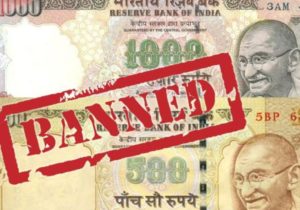 On 8th November hundreds of millions of people were startled to find their country had inflicted a grievous act of self-harm which would throw society into disarray. If they had bothered to switch on foreign news, they might also have noticed the US presidential election polls were closing. Continue reading
On 8th November hundreds of millions of people were startled to find their country had inflicted a grievous act of self-harm which would throw society into disarray. If they had bothered to switch on foreign news, they might also have noticed the US presidential election polls were closing. Continue reading
Category Archives: Politics
When cash becomes paper
Filed under Politics
Hong Kong’s LegCo elections
On 4th September, sandwiched between the Brexit vote and the US elections, Hong Kongers have the opportunity to vote in the four yearly LegCo elections.
Hong Kong’s democratic processes are a hangover from its colonial days – the first election took place in 1995 two years before handover. UK graciously offering HK a tantalising taste of democracy, after having denied it to for the preceding 150 years.
HK’s legislature currently has 70 members, half of them are elected from five geographic constituencies, and most of the rest either by business sectors (like industry) or professional bodies (like accountants), so-called “functional” constituencies. A myriad of different political parties are fielding candidates – with seemingly more parties than there are constituencies seats. The parties loosely fall into the pro-Beijing “Establishment” camp which controls LegCo and the pan-democrat “Opposition” camp.
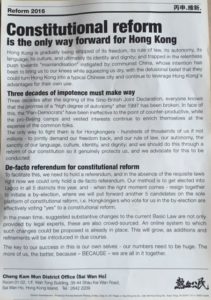 This year, the opposition is being split by the entry of eight, young localist candidates emboldened by the Occupy movement that want constitutional reform (which is code for the un-constitutional secession from Mainland). The well-known Umbrella movement leader Joshua Wong is still under 21, so cannot stand. You can get a flavour for their politics from the leaflet. They have a long litany of grievances against the Mainland: that Hong Kong takes in 150 Mainland immigrants a day (randomly chosen by ballot, unlike other countries that select by thickness of wallet), there is a weakening of Cantonese culture, particularly through greater teaching of Mandarin at schools and meddling in domestic HK politics by the central communist party. Their biggest fear is that HK will become just another Chinese city and lose its unique identity. At the time of writing one of the candidates had his candidacy invalidated because he refused to sign a form agreeing Hong Kong is an inalienable part of China.
This year, the opposition is being split by the entry of eight, young localist candidates emboldened by the Occupy movement that want constitutional reform (which is code for the un-constitutional secession from Mainland). The well-known Umbrella movement leader Joshua Wong is still under 21, so cannot stand. You can get a flavour for their politics from the leaflet. They have a long litany of grievances against the Mainland: that Hong Kong takes in 150 Mainland immigrants a day (randomly chosen by ballot, unlike other countries that select by thickness of wallet), there is a weakening of Cantonese culture, particularly through greater teaching of Mandarin at schools and meddling in domestic HK politics by the central communist party. Their biggest fear is that HK will become just another Chinese city and lose its unique identity. At the time of writing one of the candidates had his candidacy invalidated because he refused to sign a form agreeing Hong Kong is an inalienable part of China.
Altogether 89 candidates are contesting the 35 geographic seats, and 65 candidates are contesting the functional seats. Two of my friends are standing in the election. One is already a LegCo member he’s a renowned pan-dem lawyer whose interests include environmental and social issues. He is seeking re-election for the accounts functional constituency. The other is a district councillor, originally from the Netherlands, but settled on HK for many years and who is making his second stab at the elections.
The candidates sometimes hang around the MTR stations. I spoke to Cheng Kam Mun one of the young localists about what policies he stood for aside from freedom from the Mainland, but drew a blank. His campaign is only really fought on one axis – opposition to Mainland China. This is a shame because there is so much more young politicians like him could and should get hot under the collar about.
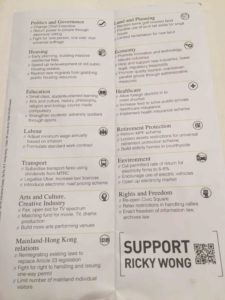 As someone who spends more time listening to LegCo debates than is healthy I have a lot of sympathy for the young people’s views that politics is not representing their interests. They characterise all villainy as emanating from Beijing, but there are baddies closer to home, too. A couple of weeks ago I listened to the debate on the medical bill. The Bill aims to make it easier for foreign qualified doctors to practice in HK, and also to increase lay representation on the medical complaints board. The bill was successfully filibustered by the “expert” LegCo member from the doctor’s functional constituency. Another debate on a proposed scheme to introduce premium taxi franchises was roundly attacked by LegCo members for upsetting the existing interests of taxi drivers and taxi license owners. The least bland politican is “Long Hair” Leung Kwok-hung who has been almost impeached, physically thrown out of the chamber and imprisoned for his implacable views but who genuinely cares about worker rights and minimum wages and is one of the few people that visibly represents the common man in the chamber. The other person to look out for is Ricky Wong. He is a successful businessman, more Bloomberg than Trump, and is running on a get rid of CY ticket but also favours Hong Kong business becoming more hi-tech and competitive, and breaking the grip of the current business interests.
As someone who spends more time listening to LegCo debates than is healthy I have a lot of sympathy for the young people’s views that politics is not representing their interests. They characterise all villainy as emanating from Beijing, but there are baddies closer to home, too. A couple of weeks ago I listened to the debate on the medical bill. The Bill aims to make it easier for foreign qualified doctors to practice in HK, and also to increase lay representation on the medical complaints board. The bill was successfully filibustered by the “expert” LegCo member from the doctor’s functional constituency. Another debate on a proposed scheme to introduce premium taxi franchises was roundly attacked by LegCo members for upsetting the existing interests of taxi drivers and taxi license owners. The least bland politican is “Long Hair” Leung Kwok-hung who has been almost impeached, physically thrown out of the chamber and imprisoned for his implacable views but who genuinely cares about worker rights and minimum wages and is one of the few people that visibly represents the common man in the chamber. The other person to look out for is Ricky Wong. He is a successful businessman, more Bloomberg than Trump, and is running on a get rid of CY ticket but also favours Hong Kong business becoming more hi-tech and competitive, and breaking the grip of the current business interests.
I asked young members of my team famous people they would most like to have a heart-to-heart conversation with. Their choices were mainly global. One person said Chris Patten. The reason they gave was because they wanted to hear how Patten made decisions especially how he traded off different people’s interests. A second colleague said they’d love to spend time with Bill Gates or the person that set up Facebook. Both these figures had been at the heart of technologies that so changed everyone’s life. A third person said Tsai Ing-Wen, the then President–elect of Taiwan. Tsai is the first female head of state in Taiwan, and perhaps also the Sinophere.
Anyway I’ll simply be observing the elections. Temporary residents like me aren’t allowed to vote.
…What just happened yesterday?
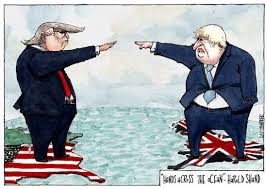 Still can’t get my head around yesterday. In all my adult life yesterday is only the third time I’ve voted for the winning person / option (the other two were voting for Maya in the Camden Council elections). Usually whatever I vote for loses. Maybe I should campaign for Trump to avoid this.
Still can’t get my head around yesterday. In all my adult life yesterday is only the third time I’ve voted for the winning person / option (the other two were voting for Maya in the Camden Council elections). Usually whatever I vote for loses. Maybe I should campaign for Trump to avoid this.
Filed under Politics
Why I finally voted leave
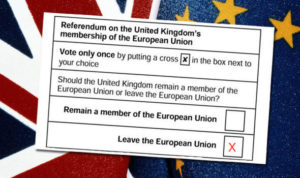
I posted my “Leave” vote on Tuesday. Thanks for the tens of responses to my earlier post people sent me either by email, posted on Facebook or on this website. All but three counselled Remain. I was, in fact, going to vote “Remain” right until Monday evening. This was a mainly through reading the anti-smoking campaigner Clive Bates’ cogent article . His basic case is: no matter how much you despise the EU (and does he despise it!), leaving it you remain exposed to its idiocies without any ability to improve it. Also the style of Brexit that Boris Johnson will adopt, should be become PM in a few months’ time, would – pandering to CBI and other powerful interests – be the Norwegian option. So Clive’s solution is to Remain and be the permanent grumpy sod that stops any further craziness taking place. Trouble is, that’s exactly what UK officials have been trying to do for five or six years, and it hasn’t worked.
And I don’t think the Norwegian option is going to fly with UK voters. I have no idea what the UK settlement with the EU will be like, should we leave. But I doubt if it’ll be like Norway’s. Like Tolstoy says: “All happy families are alike; each unhappy family is unhappy in its own way.” We have to negotiate our own divorce terms. Even if Boris personally might have no problem with uncontrolled flows of workers from other EU countries the people that voted for Brexit won’t be able to accept it. I hope the accommodation on trade in goods looks a lot like now, for a few years. Firms in the EU and the UK will want to maintain trade links. So yes, many in the EU might want to give us a good pistol-whipping – but devising a harsh pistol-whipping takes more effort and skill the the EU Commission can realistically muster.
So what made me change back to “Leave” at the last minute? Three things:
I enjoyed reading The Labour Case for Brexit. (Incidentally if you never experienced a political vacuum then take a look at the Liberal Leave website: remarkable not in what it says, but in that it exists at all.) The Labour Case has good essays by Gisela Stuart who was involved in negotiating the Lisbon Treaty back in the day, and Bryan Gould a New Zealander and former UK politician. Stuart argues that a vote to Remain will be interpreted as endorsement of the EU’s current agenda for deeper political and diplomatic union and that a remain vote is actually a vote for a much expanded role of the EU. Gould argues that the EU through focussing so much at the internal market, has neglected outside commercial opportunities – a dumb tactic given the Asiatic shift of the world economy. There’s also an interesting article by Roger Godsiff about how the rules on workers’ rights in the UK and how with the exception of rights for part-time workers all were initiated in the UK before the EU, or there is no EU requirement for them.
Second source was the Vote Leave site. This isn’t the most edifying of resources for the undecided but there are some interesting stats on the shrinking share of the EU in terms of global GDP and its faltering efforts to conclude trade deals.
The third source was nothing to do with the Leave campaign but a depressing email I received on the Consumers International mailing list about the anti-democratic capitulation of the EU in its deals with big business. The issue is endocrine-disrupting chemicals; these substances are found in pesticides and are added to plastics to make them soft. They are linked to low sperm count, and certain cancers. There has been an agreement since 2013 to ban EDCs and the Commission was tasked with creating the list of banned substances. And then it stalled. Industry has provided a sacrificial list of “low potency” molecules it is prepared to see banned which excludes endocrine disruptors it wants to continue selling. They’ve hired fake experts to make their case. The same tactics the tobacco lobby used to halt regulation of cigarettes. The impact assessment containing the evidence is secret, even member state Governments aren’t allowed to see it. At the moment we have the unedifying site of the unelected EU Commission being taken to court by France, Sweden and the EU Parliament for failing in its duty to openly debate with stakeholders and regulate business in the public interests.
In a way this episode illustrates what’s good about Europeans, and what’s wrong with Europe. I am glad that France and the Scandinavian countries have been so active on this issue within the EU. Their behaviour shows the readiness of progressive Governments to react swiftly to challenges thrown up by science and politics. But equally it’s dismaying to see the slowness and complacency of the EU institutions in responding to the needs of its people, and the larger failure of democracy and civil society to engage with Brussels. We are not sufficiently European in our identities to be governed at the EU level. And in my opinion, until that changes, the EU should remain just a free trade area and limit its activities to setting EU wide standards.
Filed under India ExPat living, Politics
I’m a left-leaning environmentalist and (I think) I’ll be voting to leave the EU. Here’s why.

Do you know the name of the President of the EU? How about any of his 28 strong Cabinet? Me neither. (Ans: Jean-Paul Juncker and the UK nominee to his Cabinet is the famous-to-his-mother Tory politician Jonathan Hill). Europe politics is defined by its anonymity, and its considerable power wielded in near silence.
My first experience of work, in the early nineties was as an economist in UK’s Ministry of Agriculture. At the time EU was swimming in lakes of wine and buried in piles of unwanted cereal, beef, butter & milk powder, even tobacco. These were bought from farmers above the world price and disposed of, or stored at huge cost. One particularly noxious bit of analysis I did was rebadging unwanted cereals as ‘food aid’ which EU would dump onto world markets. The consequences on farmers’ livelihoods in developing countries was disregarded, such was the overarching priority to rectify EU’s short-term budgetary crisis caused by the glut. Gladly the surpluses are now gone, sadly the dispossessed farmers in Africa and South America are probably still living in some urban slum. I found those years a scary demonstration of EU’s lack of accountability to civil society and the capacity of powerful lobbyists to guard entrenched interests against the global good. The farming lobby was more adept at influencing Brussels thinking, Civil Society was simply less cunning and more parochial in the way it organises itself. WWF’s European office budget has a budget of around £3m (15% from the EU Commission). Its UK office has a budget of £61m, £9.4m of which is spent on campaigning. This isn’t a criticism of WWF. At least it publishes information on spending by its Brussels office. Others don’t bother. It probably reflects how donors want their money to be spent: more on conservation less on lobbying; more within the UK, less within Brussels. Few appreciate that agricultural & fisheries policy, and many conservation directives are made at the EU level. Our identities are largely national; we expect power to be wielded in London not Brussels (or Strasbourg, depending on which week of the month it is).
One of my projects, as a consultant at ECOTEC, was carrying out an evaluation of structural fund spending in Yorkshire. The incredibly prescriptive rules meant that instead of asking ex-miners from Yorkshire about their preferences, the ‘big picture’ objectives agreed in the Brussels sausage-machine were imposed. The rules meant spending couldn’t be on drug-rehabilitation, housing, public services or income support. Instead projects had to aid tourism, high-tech and any other favoured sectors which the latest nonsensical horizon scanning had dreamt up, had to be match-funded and big-ticket. It was great work for consultants like me but did it actually help the poor taxpayers in Yorkshire. Who knows? Here is a meta-evaluation by ECOTEC of the benefits of structural funds at around that time. The report tactfully concludes the sums of money distributed by the EU’s structural funds were not large enough to have a measurable effect. Bear in mind that ECOTEC was very much a passenger on the EU gravy train and earned well over of 50% of its income from the EU. I enjoyed great jollies flying around Madrid, Athens and Brussels on fun pan-European research projects that never achieved anything apart from educating me on how to build economic models of renewable energy economics.
So what is the EU government actually does and what affect does its actions have on the environment? Membership of the EU impinges on us in a small number of discrete ways. Here’s my list:
- Direct financial spending by the EU and contributions to the EU
- EU directives standardising product safety rules
- Single market rules impacting on Government spending
- Environmental regulations
I will mainly restrict discussion to environmental and agricultural issues.
Direct spending
UK contributes around £12.9bn to the EU (after its rebate) and receives £4.4bn – a deficit of £8.5bn. As a relatively rich country – I don’t think UK should begrudge the fact it is a net contributor to the EU budget. And the level is contribution is quite small compared to overall spending – just 1.5% of UK’s Government £730bn annual budget. By way of comparison the US Federal budget is is £2000bn, a third of total public spending. The problem with the EU budget is not its size, but its composition.
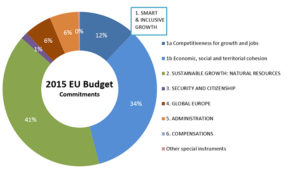
Of all the things the EU could spend money on – why is 41% of the budget still being spent on supporting farmer incomes? Why not incomes of security guards, or waitresses? They’re pretty lowly paid too. Maybe in 1957 when when the EEC was created supporting agriculture made some sense – but it hasn’t for decades, and yet the EU is so incapable of reform that 60 years later we still support ownership of agricultural land. And the way the rules are crafted is pernicious – support is £300/ha for arable land. But it drops to £200/ha for woodland. And there is no support for holdings of less than 5ha. Perhaps the UK could do with more traditional woodland landscapes and less cereal but the rules encourages maintenance of the agricultural land rather than the re-wilding of land George Monbiot so brilliantly writes about in his book Feral. Perhaps as a result the territory of Hong Kong has more biodiversity and a greater share of genuine national park than UK.
About a third of the EU budget is spent on helping reducing regional inequality. Historically, and quite correctly, UK as a rich country has received only a small share of structural funds: recipient regions include Northern Ireland, Highlands, West Wales, Yorkshire have. The bulk of money was spent in the Portugal, Ireland, Spain and Greece countries, and more recently in the Central and Eastern European (CEE) countries. The transfer to Poland is worth around €500 per person per year. But stepping back a little why do we shower these particular countries with money? Do British feel really have such a close affinity to CEE nations. For historic and familial reasons many people in the EU – myself included – have closer links with nations in African, Asian and South America. I would rather money be spent on global development issues rather than within the Club of Brussels.
EU single market regulations
EU sets product standards to ensure goods can be freely traded within the single market. These standards primarily govern product safety, but also environmental considerations, covering allowed emissions from road vehicles, and energy labels on electrical appliances. These often get parodied and lampooned in the press. In my own experience I think these have been a resounding success. They have forced manufacturers wanting to sell into the 500 million people EU market to adopt tough health & safety and environmental performance standards. Here in HK I cite these standards to officials and regulators. The Euro V standard is used as a benchmark performance standard for road fuels sold in HK, a surprising externality from the EU’s excellent standard setting work!
So no complaints from me on this score.
Government procurement rules & State Aid Rules
EU rules on public procurement and state aid have a huge impact on member states budgets, dwarfing the direct contributions into, and from the EU. The rules are set up to force government to open up tendering Europe and prevent subsidising local firms in a way that distorts EU competition.
This means that the 14% of EU GDP attributable to Government contracts covering waste services, contracted out health and education services, publicly funded infrastructure have to be offered on open tender across Europe. These rules apply to relatively small tickets items of 200,000 or more. Around 160,000 tenders a year are published on the Office Journal (OJEC), around 10% of these are from UK / Ireland. The rules greatly protract the awarding of contracts that are annoying to tenderer and firm alike. This complexity is off-putting to many small companies and are routinely won by big firms with specialist departments that know the ropes.
State Aid Rules forbid member governments from paying more than €200,000 support over three years to any firm without prior approval from the EU. Approval is only given if there is market failure or a general economic interest argument to the State Aid.
But what exactly is wrong with Government’s using taxpayer money to help their nation’s businesses? Why should the EU Commission’s KPI to ever extend the single market override a nation’s prerogative to stimulate the development of sectors or local firms. Policy makers are fond of saying Government is bad at picking winners. This is a point of view, not an empirically confirmed fact. Read Ha-Joon Chang’s excellent books which highlight how the Asian tigers like South Korea grew using levers like procurement and state aid. Major contracts like building rolling stock for London Underground can help retain jobs in deprived areas. They can stimulate restructuring of the economy helping a depressed region pick itself up. Why should Government sit around twiddling its thumbs while the EU Commission opines about the public interest merits of support for an ailing business or industry?
The State Aid and Public Procurements rules are an affront to the reason why people elect their Government. Maintaining the jobs and livelihoods of its people is one of the basic functions of our elected Government.
Regrettably, WTO rules impose similar, but thankfully weaker, restrictions on Government to support its local economies. Also its enforcement powers and institutions are much weaker than the EU Commission’s.
EU’s environmental regulations
Through its environmental directives the EU have a pervasive impact on UK regulations. For instance, the Industrial Emission Directive and its predecessor directives have been applied to emissions from power stations and factories. Similar Directives apply to emissions to water, bathing water, waste going to landfill. Brussels also sets targets for the share of renewable energy production and energy efficiency.
Proponents of the EU argue UK will repeal these environmental policies given the chance. I am less pessimistic about UK citizen’s sense of priorities. It is important to recognise that many of the environmental targets are not negotiated and set by the EU but by broader regional groupings of countries. Air emissions targets are agreed by the UN-ECE in Geneva, covering not just Europe but also North America. I was fortunate enough to involved first hand in these discussion in the 1990s. The UN-ECE oversaw excellent science based targets looking at the damage caused by acid rain, and then set necessary reductions in targets. EU’s directives are merely a mechanism for implementing increasingly stringent environmental UN-ECE targets.
Similar pan-regional bodies exist for protecting fish stock in the North Atlantic (ICES) and marine pollution (OSPAR). Countries like Iceland have adopted different and more successful policies to manage fisheries than the EU – making use of tradable quotas and banning discards of by-catch.
While much EU environmental regulation is effective, some is not. But EU’s decision making process to correct inevitable errors is sclerotic, and its ability to reform itself pitiful. The graphic below shows the ignominious failure that is the EU-ETS. After eleven years, and three phases the EU, still fails to set meaningful ‘caps’ on emissions and permits member states and emitters with vested interests to continue emitting carbon with near impunity. Yes, EU’s share of renewables in electricity generation has grown over recent years, but this has been at the expense of gas and nuclear, not of coal! This relative growth in coal use is testament to the failure of the EU-ETS.
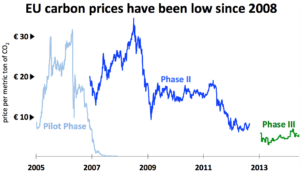 And worse, the EU’s ineffective policy on carbon emissions crowds-out progress on a genuinely effective policy like carbon taxes. I am highly supportive of George Osborne’s carbon floor price. This is a top-up tax on the EU-ETS which steadily rises over time. It provides the electricity sector a strong and unambiguous future path on the price on emissions guiding both fuel choice and investment decisions. Instead of embracing policies that work, to his shame the EU climate Commissioner continues to speak against the carbon floor prices because the EU does not have legal competence over taxation. Never mind that it works, its problem is it wasn’t invented here!
And worse, the EU’s ineffective policy on carbon emissions crowds-out progress on a genuinely effective policy like carbon taxes. I am highly supportive of George Osborne’s carbon floor price. This is a top-up tax on the EU-ETS which steadily rises over time. It provides the electricity sector a strong and unambiguous future path on the price on emissions guiding both fuel choice and investment decisions. Instead of embracing policies that work, to his shame the EU climate Commissioner continues to speak against the carbon floor prices because the EU does not have legal competence over taxation. Never mind that it works, its problem is it wasn’t invented here!
So that was my list of reasons why I think UK should leave the EU. Many of these arguments aren’t so much reasons for UK leaving per se, but reasons for the EU either ceasing to exist, or doing much less. It’s what I’ve believed for most of my professional life.
Eighteen months ago I moved to Hong Kong and my perspective has shifted. I recognise the EU Commission does some things well like: setting product safety and environmental standards, allowing free movements of goods and people, and much of its environmental regulations. It does other things badly.
Though I don’t feel particularly European and have only the haziest recollection of who Jean Monnet is – I do recognise and appreciate the EU super-state is a fairly benign institution. The same cannot be said for China. Over the past fifty years, through the repression of its people the State has killed many people. The world’s most potent super-power US has also caused its fair share of misery over the past fifty years bombing, imposing sanctions, or overthrowing tens of regimes. The EU super-state has never shown that sort of murderous repression to its own or other country’s people.
One source of nervousness about leaving the EU is whether UK’s departure will cause a disintegration of the EU and leave China and US as the only superpowers. I prefer the European way. My other source of disquiet is what a UK outside the EU will look like. Listening to pro-Brexit campaigners I am repelled by their arguments. They are often anti-immigrant/refugee, pro-small Government and pro-free trade. This isn’t my agenda.
Where are the political leaders like Tony Benn who used to champion the progressive case for leaving the EU? Though I don’t much like the EU, remaining seems less less bad than having the UK led by the present pro-Brexit leadership. Hopefully over time the xenophobes and libertarians will be replaced by a more benign leadership, but I do worry about the current absence of the progressive pro-Brexit voice.
This isn’t a great reason to vote Remain, but one I bizarrely and unexpectedly find myself being drawn to. June 23rd…what should I do? Do please offer your own thoughts.
Filed under Politics
